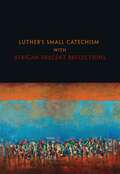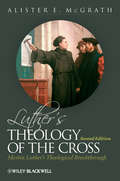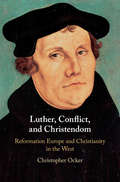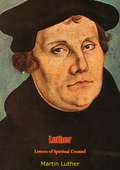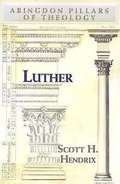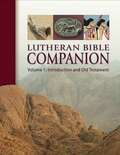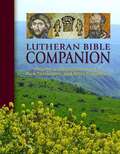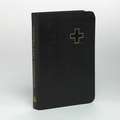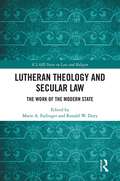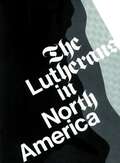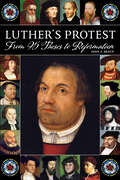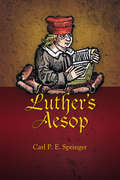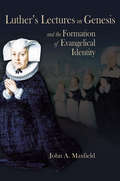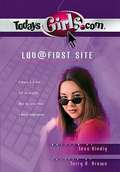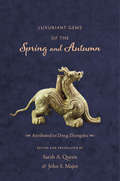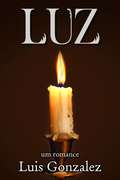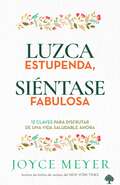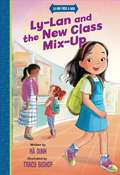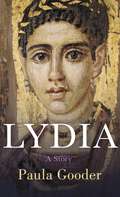- Table View
- List View
Luther's Small Catechism with African Descent Reflections
by Augsburg FortressIn connection with the observance of the five hundredth anniversary of the Reformation events initiated by the 95 Theses, a distinguished group of African descent Lutheran theologians gathered at the offices of the Evangelical Lutheran Church in America (ELCA) to explore and reflect on Luther's Small Catechism. While continuing to affirm the gift of the Small Catechism in the life of the church, they recognized that the meaning of these explanations of Christian faith could and should be broadened to address the historical, cultural, and linguistic experience of Lutherans of African descent, both on the African continent and in the diaspora. In the Small Catechism Luther presented central articles of Christian faith, then asked and answered a critical question: "What is this?" or "What does this mean?" Luther's answers were contextual, addressing his historical, cultural, and social settings. This edition of Luther's Small Catechism is not only the version of the Small Catechism widely used among Lutherans in North America today, but also includes reflections from a distinguished group of African descent Lutheran theologians. These brief commentaries offer additional context, language, and illumination from the experiences of African descent people, both past and present, to enrich our understanding of the Small Catechism and enliven faith. -- Excerpt from the introduction by the Rev. Dr. James Kenneth Echols (1951- 2018).
Luther's Theology of the Cross
by Alister E. McgrathLuther's Theology of the Cross represents a fully revised and updated edition of the classic 1985 text that expands on the author's ongoing research and reflects 25 years of Luther scholarship. Rewritten and expanded edition of a highly-acclaimed classic text Incorporates primary and secondary sources that have become available since the publication of the first edition Draws on advances in our understanding of the late medieval intellectual, cultural, and religious background of Luther's early development, and the nature of Luther's doctrine of justification (including the so-called 'Finnish' school), many of which have not yet been incorporated into Luther scholarship Luther's 'theological breakthrough' continues to be of central importance to Reformation Studies and the development of Protestantism Written by one of the world's leading Protestant theologians, who is an authority on the development of the doctrine of justification. His classic work Iustitia Dei: A History of the Christian Doctrine of Justification is now in its third edition (2005)
Luther, Conflict, and Christendom: Reformation Europe and Christianity in the West
by Christopher OckerMartin Luther - monk, priest, intellectual, or revolutionary - has been a controversial figure since the sixteenth century. Most studies of Luther stress his personality, his ideas, and his ambitions as a church reformer. In this book, Christopher Ocker brings a new perspective to this topic, arguing that the different ways people thought about Luther mattered far more than who he really was. Providing an accessible, highly contextual, and non-partisan introduction, Ocker says that religious conflict itself served as the engine of religious change. He shows that the Luther affair had a complex political anatomy which extended far beyond the borders of Germany, making the debate an international one from the very start. His study links the Reformation to pluralism within western religion and to the coexistence of religions and secularism in today's world. Luther, Conflict, and Christendom includes a detailed chronological chart.
Luther: Letters Of Spiritual Counsel (The Library Of Christian Classics Ser. #No. 54)
by Martin Luther Theodore G. TappertMartin Luther is often thought of as a world-shaking figure who defied papacy and empire to introduce a reformation in the teaching, worship, organization, and life of the church. Sometimes it is forgotten that he was also a pastor and shepherd of souls. Collected in this volume are Luther’s letters of spiritual counsel, which he offered to his contemporaries in the midst of sickness, death, persecution, imprisonment, famine, and political instability. For Luther, spiritual counsel was about establishing, nurturing, and strengthening faith. Freshly translated from the original German and Latin, these letters shed light on the fascinating relationship between his pastoral counsel and his theology.“Since spiritual direction is not the wholesale application of general principles, but the painstaking working out of spirituality in specific situations, the personal letter is one of its best expressions. Luther knew the holy gospel and the human heart, and the double knowledge is evident on the pages of these letters.”—Eugene H. Peterson, Regent College
Luther: Visionary Reformer (Abingdon Pillars of Theology)
by Scott HendrixAbingdon Pillars of Theology is a series for the college and seminary classroom designed to help students grasp the basic and necessary facts, influence, and significance of major theologians. Written by noted scholars, these books will outline the context, methodology, organizing principles, primary contributions, and key writings of people who have shaped theology as we know it today."Martin Luther would be shocked to hear that he is appearing in a series called pillars of theology. To be sure, the professor of biblical interpretation with a doctorate in theology was a theologian. In fact, teaching theology for thirty-four years at the University of Wittenberg brought into Luther's large household, managed by his wife Katharina von Bora, the only salary he ever earned. Still, like most theologians, Luther never thought of himself as having a theology. A theologian becomes a pillar of the discipline in the estimation of admiring readers, but they are not the focus of this book. My purpose is to lay the groundwork and identify the pieces that were later used to construct what is now called Luther's theology." From the book
Lutheran Bible Companion
by Edward EngelbrechtTap into the treasures of God's Word with the Lutheran Bible Companion, the first-ever comprehensive guide to the Bible featuring commentary that reflects Lutheran theology. Inside Volume 1, readers find new understanding for personal meditation or preaching in the expansive timeline of the Old Testament. Fascinating insights on the Bible's themes provide additional depth: Theological topics and literary features found in each book Significant events, people, and places found in detailed outlines and maps Biblical reflections from Martin Luther and Johann Gerhard Color photography and art illustrating stories, daily life, and landscapes (600+)
Lutheran Bible Companion, Volume 2: Intertestamental, New Testament, And Bible Dictionary
by Edward EngelbrechtEnrich your Bible study like never before with this visually stunning and practical resource which includes: • Overview and introductions to all New Testament books; • Historical, literary, and theological descriptions; • Summary commentaries, outlines, illustrations, and maps; • Insights from Martin Luther and Johann Gerhard; • Reviews and recommendations for additional resources.
Lutheran Catechesis: A Comprehensive Guide to Catechesis for a Lutheran Congregation (2nd Edition)
by Peter C. BenderThe catechist edition of Lutheran Catechesis and the Lutheran Catechesis Compendium (published separately) are intended to be used by pastors as a comprehensive guide to catechesis in their congregations. These volumes are also intended for the Lutheran day school and for parents who homeschool their children.
Lutheran Service Book: Pastoral Care Companion
by The Commission on Worship of The Lutheran Church--Missouri SynodThe Pastoral Care Companion provides numerous practical resources like Services and Rites, Resources For Pastoral Care, and Other Resources for visitations and crisis intervention.
Lutheran Service Book: Psalms and Hymns
by The Commission on Worship of The Lutheran Church-Missouri SynodThis is the complete pocket edition of the hymnal of the Lutheran Church--Missouri Synod as published in 2006. It contains the complete set of 150 Psalms in the English Standard Version, a selection of prayers, parts of Luther's Small Catechism and the Text of all the hymns. The pocket edition contains text only, no music notation and therefore was especially adaptable to a Bookshare file. In addition, it is fully marked up for DAISY navigation. At Level 1 you can quickly navigate to the Psalms, Prayers, Catechism, Hymns and Indexes. At Level 2 you can navigate from hymn to hymn. Note that the pocket edition does not contain the order of divine services. Each hymn stanza is a paragraph.
Lutheran Theology and Secular Law: The Work of the Modern State (ICLARS Series on Law and Religion)
by Ronald W. Duty Marie A. FailingerThis collection brings together lawyers and theologians in the U.S. and Europe to reflect on Lutheran understandings of the political use of the law by secular governments. The book furthers the intellectual conversation about how Lutheran insights can be used to develop jurisprudence and specific solutions to legal issues in which there is strong conflict. It presents the basic theological and interpretive assumptions of the Lutheran tradition as they may inform the creation of legislation and judicial interpretation at local, national and international levels. The authors explore Luther’s conception of the foundations of modern secular law and understanding of vocation. The work discusses the application of Lutheran theological principles to contemporary issues such as the war on terror, native land rights, property law, family law, church and state, medical experimentation, and the criminal law of rape, providing ethical insights for lawyers and lawmakers.
Lutheranism in North America, 1914-1970
by E. Clifford NelsonThis volume is the most comprehensive scholarly study of 20th century Lutheranism in North America. E. Clifford Nelson's personal experience and careful research describes decisions and events that brought Lutheran bodies in North America to their present theological and cultural positions. The book is an indispensable guide to understanding the ongoing question of fellowship and cooperation. Nelson not only provides the historical background but also spotlights some of the significant issues facing the church in the 70s. E. Clifford Nelson is professor of religion at St. Olaf College in Northfield, Minn. He has worked with the Lutheran Federation and other national and international bodies and taught for 14 years in Luther Seminary in St. Paul. Previous publications include a two volume study, The Lutheran Church Among Norwegian-Americans (E. L. Fevold, co-author of Vol I), and articles in church and professional journals as well as in encyclopedias, including in the Encyclopaedia Britannica.
Lutherans in North America
by Theodore G. Tappert E. Clifford Nelson H. George Anderson August R. Suelflow Eugene L. Fevold Fred W. MeuserLutherans came to North America, starting in the 1600s, chiefly from Germany, Norway, Denmark, Sweden, Finlad and a few from Poland and Slovakia. This book, co-authored by six Lutheran scholars, recounts their journey to North America and describes their church life once they arrived. They grouped into synods, initially based on their countries of origin and later based on conservative or liberal thinking. Much of the book concerns itself with attempts to unify Lutherans into one church with a common hymnal and style of worship. As of 1979, when this book closes its history, cooperation has increased but full unity is not yet achieved.
Luthers Protest: From 95 Theses to Reformation
by John A BraunWhy did Martin Luther leave the Catholic Church?Martin Luther’s actions were certainly not as loud or brazen as the bullhorns and picket lines of present-day protesters. Yet what began with mere parchment and nails on a church door in Germany turned into one of the most important protests in world history.Luther’s Protest examines why Martin Luther left the Catholic Church, his role in sparking the Lutheran Reformation, his theological impact on the movement, and his continued efforts to return the church at large to the Word of God.In addition, this book will show you Martin Luther’s lasting influence on the Christian faith over the past 500+ years.
Luther’s Aesop (Early Modern Studies #8)
by Carl P. SpringerReformer of the church, biblical theologian, and German translator of the Bible Martin Luther had the highest respect for stories attributed to the ancient Greek author Aesop. He assigned them a status second only to the Bible and regarded them as wiser than "the harmful opinions of all the philosophers." Throughout his life, Luther told and retold Aesop’s fables and strongly supported their continued use in Lutheran schools. In this volume, Carl Springer builds on the textual foundation other scholars have laid and provides the first book in English to seriously consider Luther’s fascination with Aesop’s fables. He looks at which fables Luther knew, how he understood and used them, and why he valued them. Springer provides a variety of cultural contexts to help scholars and general readers gain a deeper understanding of Luther’s appreciation of Aesop.
Luther’s Aesop (Early Modern Studies)
by Carl P. SpringerReformer of the church, biblical theologian, and German translator of the Bible Martin Luther had the highest respect for stories attributed to the ancient Greek author Aesop. He assigned them a status second only to the Bible and regarded them as wiser than "the harmful opinions of all the philosophers." Throughout his life, Luther told and retold Aesop’s fables and strongly supported their continued use in Lutheran schools. In this volume, Carl Springer builds on the textual foundation other scholars have laid and provides the first book in English to seriously consider Luther’s fascination with Aesop’s fables. He looks at which fables Luther knew, how he understood and used them, and why he valued them. Springer provides a variety of cultural contexts to help scholars and general readers gain a deeper understanding of Luther’s appreciation of Aesop.
Luther’s Lectures on Genesis and the Formation of Evangelical Identity (Sixteenth Century Essays & Studies #80)
by John A. MaxfieldMartin Luther's lectures on Genesis, delivered at the University of Wittenberg during the last decade of his life and later published by his students, allow modern readers to view a sixteenth-century professor engaging his students with the text of scripture and using that text to form them spiritually. The lectures show how Luther attempted to form in his students a new identity, an Evangelical identity, enabling them to make sense of the rapidly changing society and church in which they were being prepared to serve, primarily as pastors in the developing territorial churches of the Reformation.This study uses the text of the lectures to outline the contours of the new identity that Luther laid out through his exposition of Genesis. They include how Luther approached and taught his students to perceive the text of holy scripture; how that text unveiled for Luther the nature of Christian life in the world; and how Luther taught his students to view the past, the present, and the future of the church and the world through the book of Genesis.Whether in the published editions of the lectures the historic Luther was actually misunderstood or was transformed in some way into the prophetic Luther of later memory, the text reveals the Luther that his students heard and subsequent generations read.
Luther’s Lectures on Genesis and the Formation of Evangelical Identity (Sixteenth Century Essays & Studies)
by John A. MaxfieldMartin Luther's lectures on Genesis, delivered at the University of Wittenberg during the last decade of his life and later published by his students, allow modern readers to view a sixteenth-century professor engaging his students with the text of scripture and using that text to form them spiritually. The lectures show how Luther attempted to form in his students a new identity, an Evangelical identity, enabling them to make sense of the rapidly changing society and church in which they were being prepared to serve, primarily as pastors in the developing territorial churches of the Reformation.This study uses the text of the lectures to outline the contours of the new identity that Luther laid out through his exposition of Genesis. They include how Luther approached and taught his students to perceive the text of holy scripture; how that text unveiled for Luther the nature of Christian life in the world; and how Luther taught his students to view the past, the present, and the future of the church and the world through the book of Genesis.Whether in the published editions of the lectures the historic Luther was actually misunderstood or was transformed in some way into the prophetic Luther of later memory, the text reveals the Luther that his students heard and subsequent generations read.
Luther’s Legacy: The Thirty Years War and the Modern Notion of ‘State’ in the Empire, 1530s to 1790s
by Robert Von FriedeburgIn this new account of the emergence of a distinctive territorial state in early modern Germany, Robert von Friedeburg examines how the modern notion of state does not rest on the experience of a bureaucratic state-apparatus. It emerged to stabilize monarchy from dynastic insecurity and constrain it to protect the rule of law, subjects, and their lives and property. Against this background, Lutheran and neo-Aristotelian notions on the spiritual and material welfare of subjects dominating German debate interacted with Western European arguments against 'despotism' to protect the lives and property of subjects. The combined result of this interaction under the impact of the Thirty Years War was Seckendorff's Der Deutsche Fürstenstaat (1656), constraining the evil machinations of princes and organizing the detailed administration of life in the tradition of German Policey, and which founded a specifically German notion of the modern state as comprehensive provision of services to its subjects.
Luv @ First Site (TodaysGirls.com #5)
by Terry Brown Tess KindigWhen Bren develops a crush on a new student, she lies to her friends and on a computer dating questionnaire in order to be matched with him.
Luxuriant Gems of the Spring and Autumn (Translations from the Asian Classics)
by Zhongshu DongThe Spring and Autumn (Chunqiu) is a chronicle kept by the dukes of the state of Lu from 722 to 481 B.C.E. Luxuriant Gems of the "Spring and Autumn" (Chunqiu fanlu) follows the interpretations of the Gongyang Commentary, whose transmitters sought to explicate the special language of the Spring and Autumn. The work is often ascribed to the Han scholar and court official Dong Zhongshu, but, as this study reveals, the text is in fact a compendium of writings by a variety of authors spanning several generations. It depicts a utopian vision of a flourishing humanity that they believed to be Confucius's legacy to the world.The Gongyang masters thought that Confucius had written the Spring and Autumn, employing subtle phrasing to indicate approval or disapproval of important events and personages. Luxuriant Gems therefore augments Confucian ethical and philosophical teachings with chapters on cosmology, statecraft, and other topics drawn from contemporary non-Confucian traditions. A major resource, this book features the first complete English-language translation of Luxuriant Gems, divided into eight thematic sections with introductions that address dating, authorship, authenticity, and the relationship between the Spring and Autumn and the Gongyang approach. Critically illuminating early Chinese philosophy, religion, literature, and politics, this book conveys the brilliance of intellectual life in the Han dynasty during the formative decades of the Chinese imperial state.
Luz - livro i
by Luis Gonzalez Vasco Figueiredo Cruz BentoClara é uma jovem Cubana, descontente com a Revolução. Planeia partir com o marido para os Estados Unidos, para iniciarem uma nova vida. Mas uma estranha Visitação pelo Anjo Gabriel, anunciando-lhe que está grávida da nova Filha de Deus, faz com que Clara reconsidere as suas opções. Irá ela ter a criança em solo Americano? Será feliz com o marido? E Jesus, o que acha Ele da ideia de ter uma irmã? Não percam esta história, original e absorvente.
Luzca estupenda, siéntase fabulosa: 12 claves para disfrutar de una vida saludable ahora
by Joyce Meyer¿Tiene idea de cuán valiosa es usted? ¿Padece de autoestima baja o se odia a sí misma? ¿Abusa de su cuerpo por la mala alimentación o malos hábitos, o simplemente usted se coloca después de los niños, el esposo, los padres, el jefe y los amigos? Entonces, usted no entiende cuánto vale. Usted ha sido colocada en esta tierra para propagar el amor de Dios, y nada puede ser más valioso que eso. Quizás usted jamás se enteró de lo importante que es. Joyce Meyer provee un plan de doce claves para superar los hábitos de la alimentación y falta de ejercicios que nos privan de hacer todo lo que Dios nos ha llamado a hacer. Para ayudarnos a hacerlo, el pan de Joyce brinda principios que incluyen: Dejemos que Dios tome las cargas pesadas Aprendamos a amar nuestro cuerpo Hagámonos responsables ¡Y mucho más! ¡Dios tiene planeado un gran futuro para usted, y es necesario que usted esté lista para Él! Es necesario que luzca estupenda y se sienta fabulosa, lista para hacer cualquier cosa que Dios le pida que haga.
Ly-Lan and the New Class Mix-up (Ly-Lan Finds a Way)
by Hà DinhSometimes things don&’t turn out the way we plan! In this chapter book series about a daughter of Vietnamese immigrants, Ly-Lan navigates her life as a new third grader—complete with old and new friends, unexpected (and disappointing) changes at home and school, and finding a way to thrive.Third grade is not starting the way Ly-Lan pictured. First, her best friend Cece is put in another class--even after Ly-Lan prayed they would be in the same one. And then Ly-Lan is tasked with showing the new Vietnamese student around. Ly-Lan wants to hang out with Cece, not play translator to the new girl, and she doesn&’t understand why her prayers aren&’t being answered. If Ly-Lan is going to flourish in third grade, she must learn to trust in God&’s plans, especially when it means making some adjustments to her own.Ly-Lan and the New Class Mix-up:Is the first in a series of illustrated early chapter books about Ly-Lan, a third grader tackling familiar themes like friendship, overcoming obstacles, and navigating changes in life with gracePerfect for kids ages 6 and up or reluctant or emerging readers just starting to read chapter books on their own.Is an encouraging read for reluctant readers with its illustrated chapters.Is written by Vietnamese American author Ha Dinh, creator of HappyDaysinFirstGrade.com and @hellomrsdinh on Instagram
Lydia
by Paula GooderThe New Testament tells us very little about Lydia, a seller of purple cloth who was living in Philippi when she met the apostle Paul on his second missionary journey. And yet she is considered the first recorded convert to Christianity in Europe. In her second work of fiction, Biblical scholar and popular author and speaker Paula Gooder tells Lydia's story - who she was, the life she lived and her first-century faith - and in doing so opens up Paul's letter to the Philippians, giving a sense of the cultural and historical pressures that shaped Paul's thinking, and the faith of the early church.Written in the gripping style of Gerd Theissen's The Shadow of the Galilean, and similarly rigorously researched, this is a book for everyone and anyone who wants to engage more deeply and imaginatively with Paul's theology - from one of the UK's foremost New Testament scholars.
